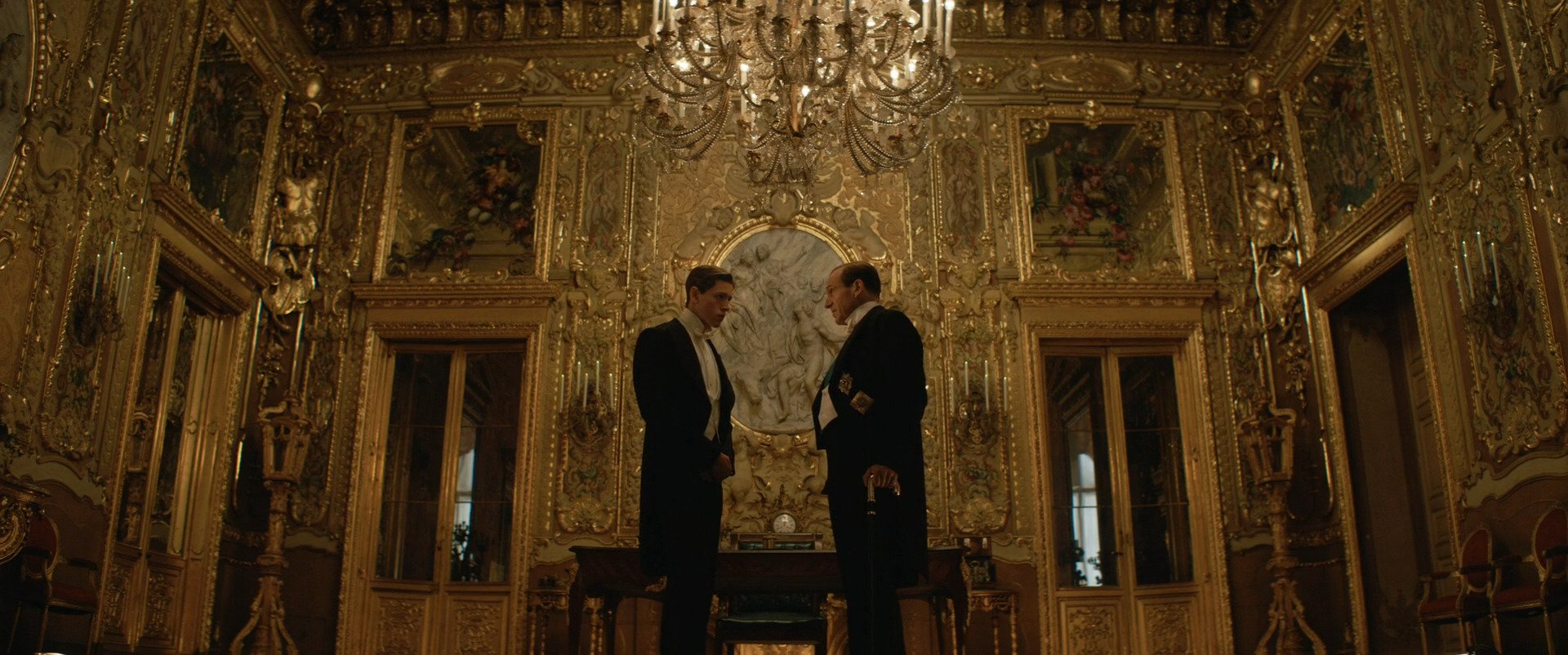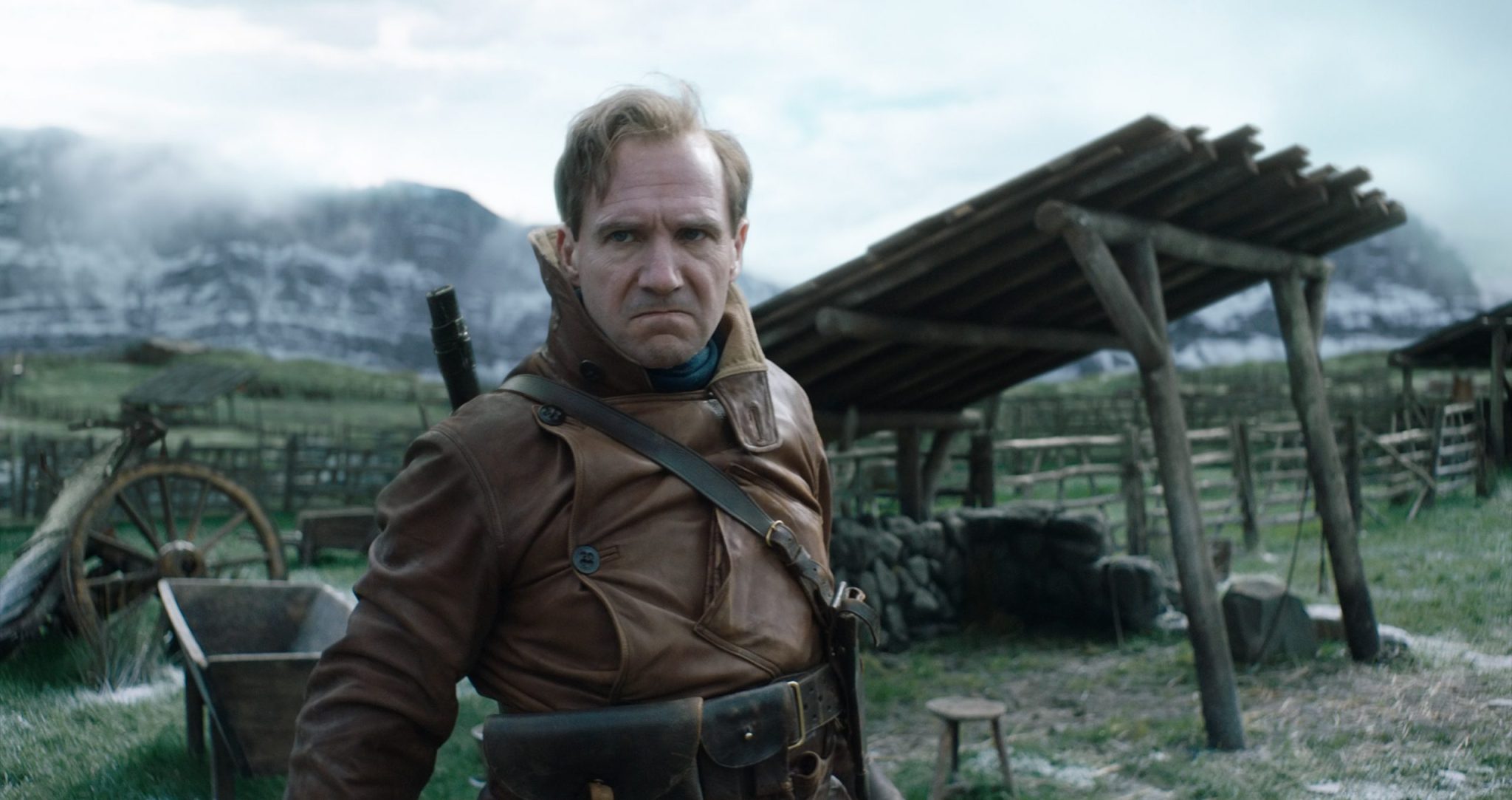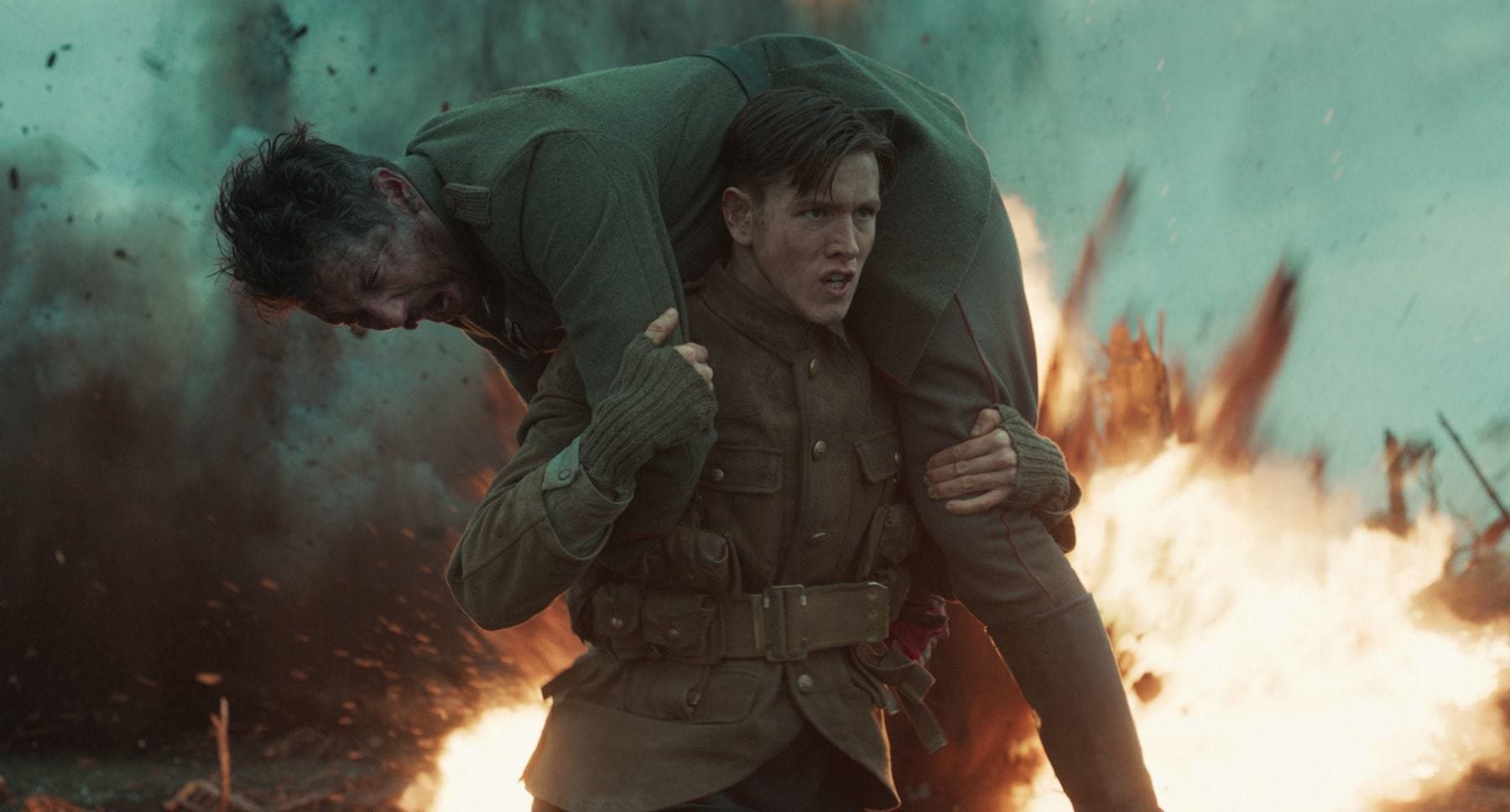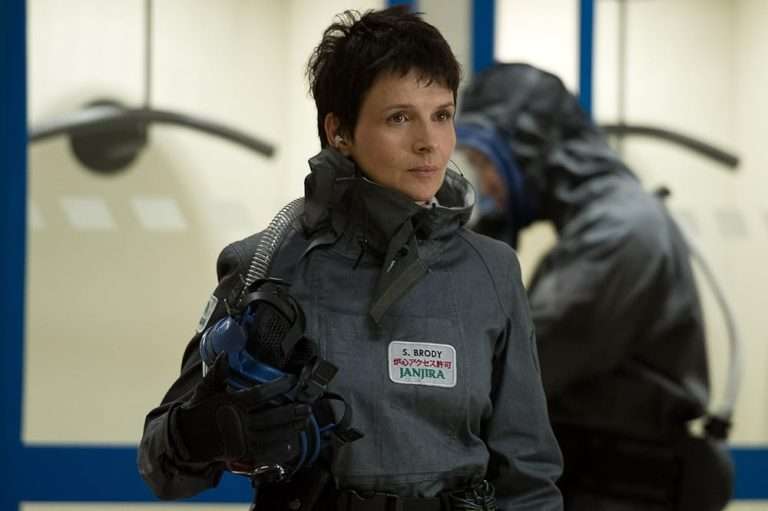The King’s Man (2021) Movie Ending Explained & Themes Analyzed: The third installment of the ‘Kingsman’ series, ‘The King’s Man’, is a prequel to both the previous films and is set in the early 20th century. Continuing with its practice of an ensemble cast, it stars Ralph Fiennes, Gemma Arterton, Djimon Hounsou, Harris Dickinson, Tom Hollander (in a triple role as King George, Kaiser Wilhelm II, and Tsar Nicholas II), Matthew Goode, Rhys Ifans, Aaron-Taylor Johnson, Charles Dance, and Stanley Tucci among a plethora of others. Unlike the previous two entries though, it eschews the franchise’s spy spoof style in favor of an action thriller using actual historical events as its backdrop.
The King’s Man Movie Synopsis & Summary:
Set essentially a century before ‘Kingsman: The Secret Service’, the plot of the prequel follows the actions leading up to the founding of the Kingsman agency. We follow the exploits of Orlando, Duke of Oxford (Fiennes), a widower who runs a network of spies from his ancestral home while also taking care of his son, Orlando (Dickinson). It is 1914 and the First World War is an imminent threat, made all the more inevitable by a globe-spanning cabal known as ‘The Flock’, run by a man who till the very end of the film, is referred to only as ‘The Shepherd’. The Flock includes among its members, the likes of Rasputin (Rhys Ifans), Mata Hari (Valerie Pachner), Erik Jan Hanussen (Daniel Brühl), and Gavrilo Princep (Joel Basman), among others, thereby having a monopoly over international relations and hence, the ability to set it ablaze as per The Shepherd’s wishes.
After the actual assassination attempt on Archduke Franz Ferdinand (Ron Cook) fails because of Conrad’s unwitting intervention, a second unexpected attack under Orlando’s watch begins the First World War as we know it. As Europe crumbles, Orlando and his own network race to stop further destruction and expose ‘The Flock’ while at home, he has to deal with his son who wishes to be a soldier and defend his country, a choice he cannot condone because of a promise he made to his wife, Emily (Alexandria Maria Lara), about ensuring his safety. What follows then is a work of pop historical fiction, intermingling wartime espionage, that boasts the likes of a swashbuckling Rasputin, a seductress Mata Hari and even a demonic goat who serves as inspiration for the leader of this evil organization.
The King’s Man Movie Themes Explained:
War, what is it good for?
‘The King’s Man’ begins in the midst of the Second Boer War as Orlando and his wife, Emily, visit his friend Herbert, Lord Kitchener (Charles Dance), as Red Cross members, and a fleeting look is provided at the disturbing sights of a concentration camp, one of many, being maintained by Lord Kitchener. As Orlando’s wife Emily is killed in a sniper attack, she asks Orlando to promise her to make sure their son, Conrad, never witnesses war again. Of course, given the period of history the film is dealing with, that is hardly a possibility. War looms over the narrative throughout the film as its background and the film ends in anticipation of another one, becoming a depiction of the powder keg that was Europe in the early 20th century, which despite its claims of being the most civilized part of the world, would go on to do more harm than any civilization in the past had done, to the entire world.
In 1914, as the First World War intensifies, Conrad, a young man at the time, is far too eager to fight on the frontlines, a stance his father vehemently opposes. This is largely because Orlando once was a soldier, vigorously fighting in service of the Queen and country too but over time had grown disillusioned with the British Empire’s expansion of their colonies through war, pillaging, and looting. He becomes a voice of conscience, trying to make Conrad understand how fighting in a war is a little more than choosing one’s own demise. This is further demonstrated by the anachronistic inclusion of Wilfred Owen’s seminal anti-war poem ‘Dulce et Decorum Est’. Partly read in Conrad’s voice in a letter he sent with Lance Corporal Reid (Aaron Taylor-Johnson) to his father, before his death, it is finished by Orlando at Conrad’s funeral, reiterating the futility of war and the irreparable loss of lives it leaves in its wake, especially of young people, hence depriving nations of innumerable unrealized possibilities.
Relationship between fathers and sons:
Before the film’s final act, ‘The King’s Man’ is essentially a father-son story about the relationship between Orlando and Conrad. Orlando is an archetypal aristocratic father figure who loves his son deeply and is overprotective, to a fault. Regardless of Conrad’s zeal to help his countrymen, Orlando is adamant about ensuring that it does not happen as both, to keep his promise to his dead wife, Emily, and as a vocal pacifist. In the end, it’s his overprotective nature that ends up costing Orlando his life as Orlando has to disguise himself as a frontline soldier so that he does not have to settle for a desk job in London.
This loving and protective filial relationship on a micro-level stand in stark contrast to its equivalent on the macro-level. By pledging themselves to join this war and continuing its exploits, the father-child relationship between a monarch and his people is shown to be the exact opposite of that between Orlando and Conrad. In the case of Kaiser Wilhelm II, it is shown to be a childhood disdain for King George and the English for making fun of his withered arm that makes him declare war. Tsar Nicholas II participates to remind the kaiser about the very deformity whose ridiculing as children are making him declare war in the first place. Hence, what is portrayed is a petty squabble between monarchs that leads them to this grave contest, an act that is utterly unlike that of a father and therefore completely disregarding their proverbial children’s wellbeing and letting them perish in millions.
Also, Read – Kingsman: The Golden Circle [2017] – A Superfluous Exercise in Excess
Upstairs and Downstairs: The prominent class difference
From the very beginning, the ‘Kingsman’ films have been heavily about class in English society, revolving largely around intermingling the gentleman spy with the working class hero, the perfect amalgamation of which is Eggsy. Yet it’s in ‘The King’s Man’ that the reliance of the aristocracy, and the upper classes in general, on the working class, is presented most prominently. The private network of spies that Orlando presides over, which is the precursor to Kingsman, is put together by Polly (Gemma Arterton) and Shola (Djimon Hounsou), his housekeeper, and butler respectively, who themselves are indispensable to its smooth day-to-day functioning. Polly also doubles as a sharpshooter while Shola is an expert swordfighter and they become the first holders of the codenames of Galahad and Merlin, respectively, at Kingsman.
The invisibility of domestic servants in the everyday lives of their employers, despite their essential nature, as well as their access into the farthest recesses of their place of employment makes them the perfect candidates for this network. As Orlando puts it, unlike government spies who struggle to eavesdrop on doors, their spies are in the very rooms at the discretion of their employers. If Harry Hart’s swagger in the first film was entirely based on the fact that he’s a gentleman, as revised a version of that concept as it may be, what this film depicts most clearly is how the working class forms the base on which the aristocracy builds itself and their vital role in keeping it alive and working, and for that matter, relevant.
The Irrationality of ‘The Call of Duty’:
The idea of duty is expressed quite verbosely towards the end as Polly gives her resignation to Orlando on seeing his apathy and dejection after Conrad’s death, yet it’s a theme that is relevant throughout the film. Instead of cowering to the modish approach of a retrospective view of history, ‘The King’s Man’ admirably provides us with how the war was viewed during the film’s setting. Not that it presents a particularly nuanced argument yet showing youthful fervor and old age’s wisdom in conflict, both right in their own ways, provides us with a look at an essential element of duty – the fact that to answer its call during desperate times, one has to overlook a rational enumeration of the pros and cons.
Conrad believes he has to fight because he does not want to be handed a feather every time he walks down a road and to him, it is his duty to see how everyone his age is dying in service of their nation. When the influence of King George relieves him of frontline duty, he lies and deceives to make his way onto the battlefield as a soldier, leaving behind his role as a grenadier officer for he believes that is the only way he can do what he deems to be right. This culminates in a crucial moment in the film when Orlando, at that moment a despairing drunkard, is made to realize by Polly that he is disappointing the memory of his son by way of his inaction. She too shares his grief yet continues with her duties, as his housekeeper and as part of the spy network, and this example, as well as being reminded of his son’s derring-do, forces Orlando to take up arms and try to achieve what he set up his said network to do in the first place.
The King’s Man Movie Ending Explained:
After killing Alfred DuPont (Todd Boyce) and managing to prevent the scandalous tape where Mata Hari seduces President Woodrow Wilson (Ian Kelly) from falling into the hands of newspapers all over America, Orlando discovers that The Shepherd is actually Max Morton (Matthew Goode), Lord Kitchener’s aide-de-camp. A Scot by birth, his parents’ mill was usurped by English aristocrats when he was still a child and ever since, he had been seeking revenge against them while also being an advocate of Scottish independence, which is why he started the war, to bring an end to aristocracies across Europe. He orchestrated Kitchener’s death while faking his own. After a tense fight during the climax, Orlando manages to kill him.
With the tape now no longer running a risk of causing a scandal, President Wilson mobilizes American troops to join the Allies in the war, leading to their victory. In ‘Kingsman: The Secret Service’, Harry Hart told Eggsy how the Kingsman agency was founded by members of the nobility who had lost their children in the First World War and hence decided to pool their resources for want of heirs, in order to restore peace and prevent others from facing their ill fate.
Orlando purchases Kingsman, the tailoring shop, and founds the Kingsman, the agency as an independent intelligence organization, giving himself the codename, Arthur while setting up the shop as its office. The other founding members are Polly, the first Galahad, Lance Corporal Archie Reid, the first Lancelot, the American Ambassador to the U.K. (Stanley Tucci), the first Bedivere, King George, the first Percival while Shola becomes their quartermaster and the first Merlin. The names, taken from the Arthurian tales, are a tribute to Conrad who used the names of characters from these stories as a child for himself and the people around him.
What does the credit sequence in The King’s Man mean?
In a mid-credits scene, Hanussen, now having taken over ‘The Flock’ in the wake of The Shepherd’s death, introduces Vladimir Lenin to a young Adolf Hitler, as the right-wing extremist to balance Lenin’s left-wing extremism and set the wheels in motion for the Second World War, though his reasons for doing so are not revealed.
The King’s Man (2021) Links – IMDb, Rotten Tomatoes
The King’s Man (2021) Cast – Ralph Fiennes, Gemma Arterton, Rhys Ifans, Harris Dickinson, Djimon Hounsou, Matthew Goode, Daniel Brühl









